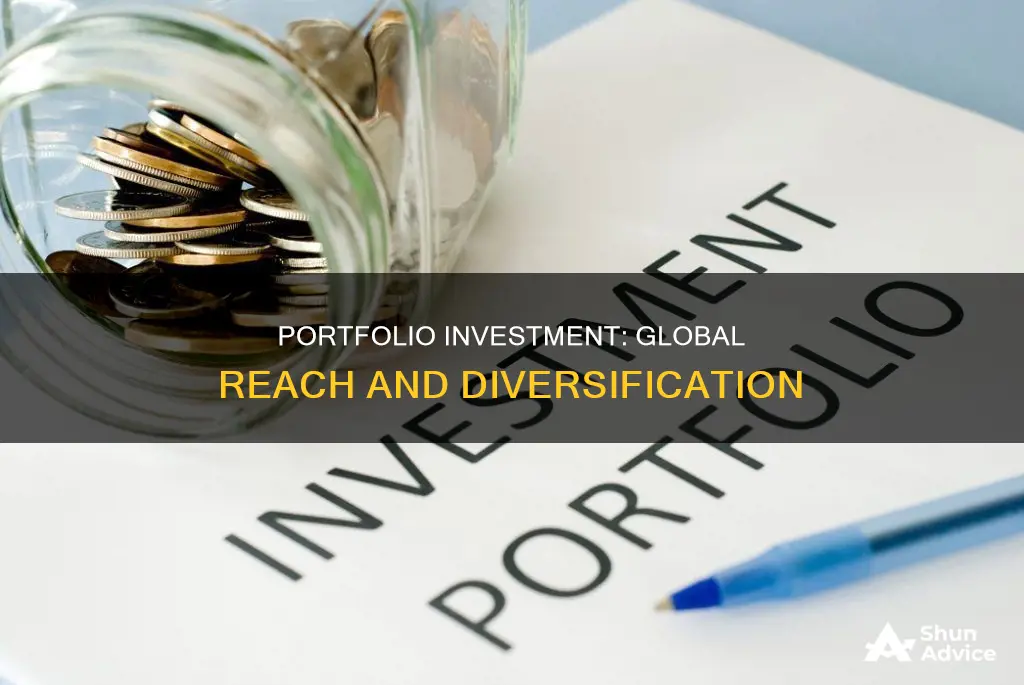
International portfolio investment (FPI) is a type of investment strategy where investors purchase financial assets in a foreign market or company. This strategy is used to diversify an investor's portfolio and gain exposure to emerging and developed markets outside of their domestic market. FPIs are passively held and typically include securities such as stocks, bonds, and mutual funds. They are also more liquid than direct investments and offer quicker returns, but they come with higher risks due to potential economic and political instability in foreign markets.
| Characteristics | Values |
|---|---|
| Definition | A selection of stocks and other assets that focuses on foreign markets rather than domestic ones |
| Purpose | Diversification, exposure to emerging and developed markets, and access to companies in other countries |
| Examples of Holdings | Stocks, bonds, American depositary receipts (ADRs), global depositary receipts (GDRs), mutual funds, exchange-traded funds (ETFs), and other securities |
| Investor Profile | Investors who want exposure to foreign markets and are willing to take on additional risks for potential higher returns |
| Benefits | Diversification, potential for higher returns, access to international companies, and reduced risk through geographic diversification |
| Risks | Currency fluctuations, political instability, economic volatility, regulatory differences, increased transaction costs, and higher share price volatility |
| Investor Types | Retail investors, institutional investors, ultra-high-net-worth individuals, and companies |
What You'll Learn

International portfolio investment (FPI)
Foreign portfolio investment (FPI) is a type of investment that involves acquiring financial assets, such as stocks, bonds, and other securities, in a foreign country. It is a passive form of investment, meaning that investors do not have direct control or management over the assets they purchase. FPI is one of the most common ways for investors, especially retail investors, to participate in an overseas economy and diversify their portfolios.
FPI provides investors with access to international markets, allowing them to spread their risk and tap into diverse economic growth opportunities worldwide. By investing in foreign financial assets, investors can also achieve a higher risk-adjusted return and generate alpha. FPI can include stocks, American Depositary Receipts (ADRs), Global Depositary Receipts (GDRs), bonds, mutual funds, and exchange-traded funds (ETFs).
The transaction of foreign securities in FPI usually occurs through formal exchanges or over-the-counter market transactions. FPI investors are exposed to increased share price volatility, which can lead to higher returns but also increases risk. These investors expect to be compensated for the risk they take.
FPI offers several benefits, including portfolio diversification, access to international credit, and the ability to invest in markets with different risk-return characteristics. It also increases the liquidity of domestic capital markets and promotes the development of equity markets. However, there are risks associated with FPI, such as volatile asset pricing and jurisdictional risk.
FPI is crucial for investors seeking global diversification and access to international markets. It provides the opportunity to invest in foreign financial assets, spread risk, and potentially achieve higher returns.
Retirement Planning: 401(k)s and Investment Portfolios: What's the Connection?
You may want to see also

Diversification of assets
Diversification is a risk management strategy that mixes various investments within a portfolio to limit exposure to any single asset or risk. A diversified portfolio contains a mix of distinct asset types and investment vehicles. The rationale behind diversification is that a portfolio constructed of different kinds of assets will, on average, yield higher long-term returns and lower the risk of any individual holding or security.
An international portfolio is a selection of stocks and other assets that focuses on foreign markets rather than domestic ones. This type of portfolio provides diversification and gives the investor exposure to emerging and developed markets. The investor might also look at some of the domestic companies experiencing their fastest growth abroad.
There are several ways to diversify an international portfolio:
- Geographical diversification: Diversifying across different countries can provide a small cushion of protection against losses during a downturn in the investor's domestic economy. For example, forces depressing the US economy may not affect Japan's economy in the same way, so holding Japanese stocks in addition to US stocks can protect against losses.
- Diversification across asset classes: Different asset classes, such as stocks, bonds, real estate, or cryptocurrency, have different risk profiles. For example, rising interest rates usually negatively impact bond prices, while they may result in increases in rent for real estate.
- Diversification across industries: Diversifying across industries can reduce the likelihood of being impacted by sector-specific risks. For example, an investor hoping to hedge against the risk of future pandemic impacts may invest in digital streaming platforms (positively impacted by more shutdowns) and airlines (positively impacted by fewer shutdowns).
- Diversification across company sizes: Lower market cap stocks have more room to grow, while higher market cap stocks tend to be safer investments.
- Diversification across term lengths: In general, the longer the maturity of an income-generating investment, the higher the risk of fluctuations in its price due to changes in interest rates.
It is important to note that while diversification can reduce risk, it can also reduce potential returns. By spreading investments across different assets, diversification limits gains in the short term. Additionally, a more diversified portfolio can be more time-consuming and expensive to manage due to increased transaction fees and brokerage commissions.
Savings vs. Investment Institutions: Where Should Your Money Go?
You may want to see also

Risks and returns
International portfolios can provide access to emerging and developed markets, offering diversification and exposure to foreign markets. However, they also carry risks that investors should be aware of. Here are some key points to consider regarding the risks and returns of international portfolio investments:
Risks
- Economic and Political Instability: Investing in foreign markets, especially emerging markets, carries the risk of economic and political instability. Changes in government policies, political coups, or economic downturns in these countries can significantly impact the value of investments.
- Currency Exchange Rate Risk: The value of an international portfolio can be affected by fluctuations in currency exchange rates. If the US dollar strengthens against the currencies of the countries in the portfolio, the returns may be reduced.
- Transaction Costs: Investing in international portfolios often involves higher transaction costs, including commissions, brokerage charges, taxes, and other fees. These additional costs can eat into overall returns.
- Volatile Asset Pricing: Some international financial markets are more volatile than others, with higher share price volatility. This volatility can increase the risk for investors.
- Jurisdictional Risk: Investing in a foreign country carries the risk of changes in laws and regulations that can impact investment returns. Additionally, investing in countries with high levels of financial crime, such as money laundering, can pose jurisdictional risks.
- Liquidity Risk: International investments may have lower liquidity, making it challenging to sell securities or access savings quickly.
Returns
- Diversification: International portfolios provide investors with access to a diverse range of assets and markets, reducing the risk of concentrating investments in a single market. This diversification can help smooth out returns and potentially increase overall portfolio performance.
- Higher Returns in Emerging Markets: Investing in emerging markets can offer the potential for higher returns. Countries with strong economic growth, favourable regulatory environments, and attractive returns can provide opportunities for investors.
- International Credit: International portfolios may provide access to increased credit in foreign countries, allowing investors to leverage more capital and potentially generate higher returns.
- Market Cycle Timing: International portfolios allow investors to take advantage of market cycles in different nations. For example, if US stocks are overvalued, investors can look for opportunities in developing regions with positive economic outlooks.
- Better Performance During US Dollar Weakness: International stocks have historically performed better during periods of US dollar weakness. When non-US currencies strengthen, investors in international stocks benefit when their returns are converted back to US dollars.
Saving Plans: The Benefits of a Conservative Financial Strategy
You may want to see also

Foreign markets and currencies
Foreign portfolio investment (FPI) is a means of portfolio diversification, where investors purchase foreign financial assets. This type of investment is becoming increasingly common, providing investors with an opportunity to diversify their portfolios internationally. An international portfolio typically consists of securities and alternative foreign financial assets that are passively held by the investor.
The transaction of foreign securities usually takes place at a formal securities exchange or through an over-the-counter market transaction. Most international stocks are denominated in non-US currencies and trade on exchanges in their local markets. For example, a stock listed on the Taiwan Stock Exchange will be denominated in the New Taiwan dollar. An exception to this is American Depositary Receipts (ADRs), which are certificates issued by US banks representing ownership in foreign companies. ADRs are denominated in US dollars and trade on US stock exchanges.
Another risk is jurisdictional risk, which arises from investing in a foreign country with different laws and regulations. A drastic change in a foreign country's laws or a prevalence of financial crime, such as money laundering, can significantly impact an investment's returns.
Additionally, currency exchange rate risk is a significant factor in international investing. The value of an investment can decrease if the foreign currency depreciates against the investor's home currency, such as the US dollar. On the other hand, a strong foreign currency can lead to gains when returns are translated back into the investor's home currency.
Despite these risks, foreign markets and currencies offer several advantages. They provide access to emerging and developed markets, allowing investors to tap into diverse economic growth opportunities worldwide. For instance, an investor based in the US might be attracted to the faster-growing economies of China and India.
International portfolios also provide diversification benefits, reducing investment risk. If US stocks underperform, gains in international holdings can offset those losses. Additionally, investing in foreign markets and currencies can be a hedge against weakness in the US dollar.
Furthermore, foreign markets and currencies can offer higher returns during certain periods. There have been times when international stocks have outperformed their US counterparts, often coinciding with periods of US dollar weakness.
When investing in foreign markets and currencies, it is essential to consider the risks and advantages unique to each country and region. Broad diversification across multiple countries and asset classes can help manage the risks associated with international investing.
Strategizing Your Investment Portfolio: A Comprehensive Guide
You may want to see also

Advantages and disadvantages
International portfolio investment (IPI) is a selection of stocks and other assets that focuses on foreign markets rather than domestic ones. It provides investors with exposure to emerging and developed markets and offers diversification.
Advantages
- Risk reduction: IPI can be used to reduce investment risk. If stocks in the domestic market underperform, gains in international holdings can balance out returns.
- Currency diversification: When investors buy stocks for an international portfolio, they are also buying the currencies in which the stocks are quoted. This can help neutralise currency fluctuations.
- Market cycle timing: Investors with an international portfolio can take advantage of the market cycles of different nations. For instance, if an investor believes US stocks are overvalued, they may look for investment opportunities in developing regions.
Disadvantages
- Political and economic risk: Many developing countries do not have the same level of political and economic stability as more developed nations like the US. This increases risks, and many investors may not feel comfortable with this level of risk.
- Increased transaction costs: Investors typically pay more in commission and brokerage charges when they buy and sell international stocks, reducing overall returns. Taxes, stamp duties, levies, and exchange fees may also need to be paid, further diluting gains.
- Currency exchange rate risk: Exchange rates fluctuate, so it is possible to lose money if rates drop significantly.
Saving and Investing: Biblical Principles for Financial Wisdom
You may want to see also
Frequently asked questions
An international portfolio is a selection of stocks and other assets that focuses on foreign markets rather than domestic ones. It gives investors exposure to emerging and developed markets outside of their home country.
International portfolio investments offer investors the chance to diversify their assets, access liquidity in other markets, and reduce the risks of the market they invest in the most. They also provide access to international markets, enhancing the potential for higher returns.
International portfolio investments can carry increased risks due to potential economic and political instability in some emerging markets. There is also the risk of unfavourable currency exchange rates and higher transaction costs.
There are a few ways to invest in an international portfolio, including purchasing individual stocks on local exchanges or through American Depository Receipts (ADRs), which are certificates issued by US banks that represent ownership in foreign companies. Another way is by purchasing a fund, such as a mutual fund or exchange-traded fund (ETF) that focuses on foreign equities.







